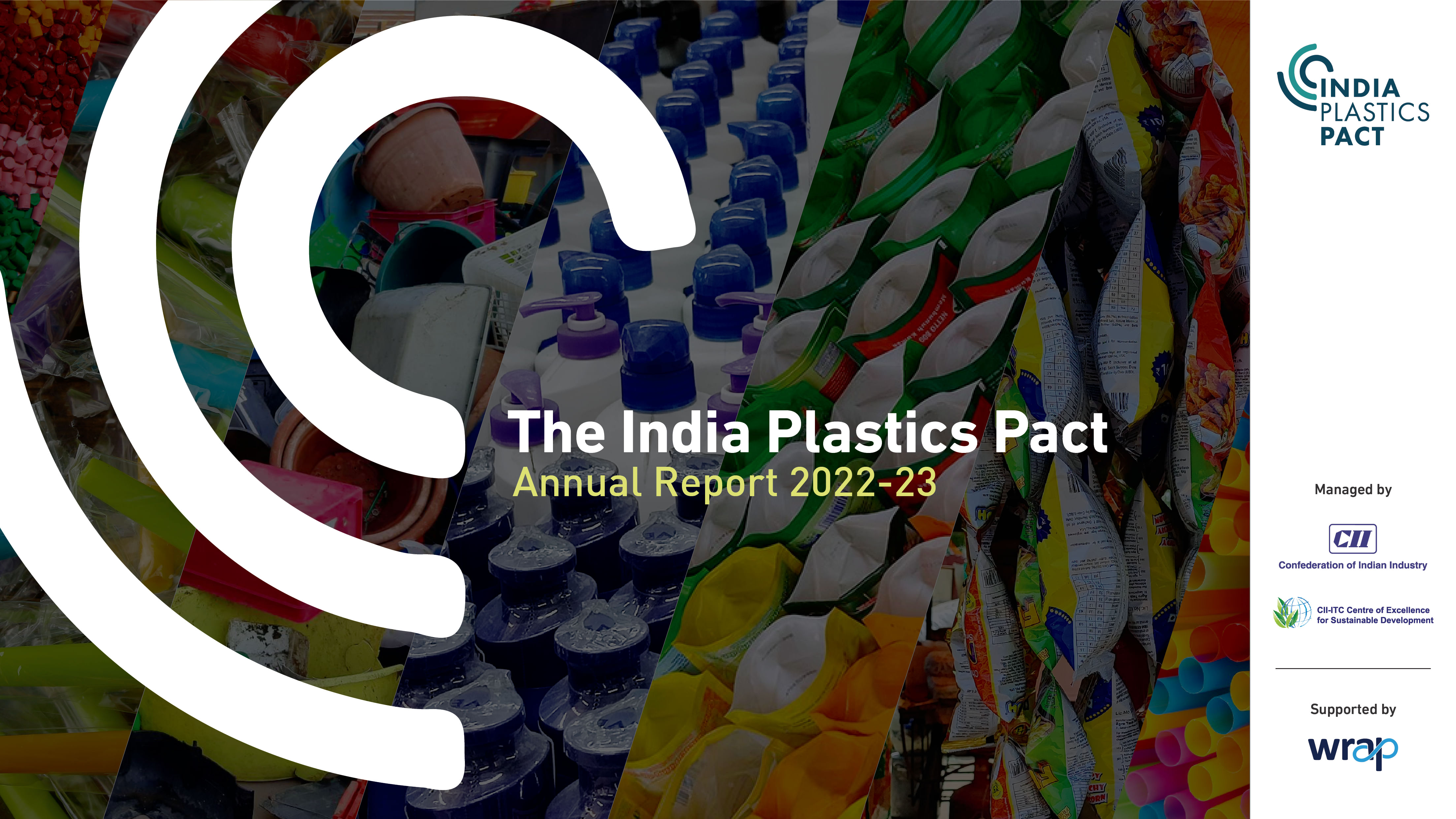India Plastics Pact releases annual report, announces recyclable packaging challenge
On 26 February 2024, the Confederation of Indian Industry (CII) held an online event to launch the India Plastics Pact’s (IPP) annual report 2022-23. Alongside, CII announced a recyclable flexible packaging challenge.
22 Mar 2024 | By Aditya Ghosalkar
“Creating a world where plastic is valued and doesn’t pollute the environment.”
A call to action. The report takes a closer look at how the Pact’s signatories, who represent the entire plastics packaging value chain, are progressing to the 2030 targets. How the value chain seeks the challenge to change: the switch from multi-material multilayer plastic films to mono-material plastic films.
Nandini Kumar, senior consultant at CII and lead at IPP, set the tone for the session. She briefed the attendees about the role of CII as a secretariat of the IPP and its governance structure.
Kumar shared snapshots of IPP campaigns, field visits, conferences, international engagements plus drop-in at retail outlets. She emphasised the importance of such activities to help understand the ground realities, present real-time data of the industry and develop documents such as design guides for packaging and a landscape assessment of recycling in India to support signatories in their journey.

The India Plastics Pact annual report 2022-23
The Pact's 2030 targets are eliminating unnecessary or problematic plastic packaging; ensuring 100% of plastic packaging is reusable, recyclable or compostable, achieving a 50% effective recycling rate; and incorporating an average of 25% recycled content across all plastic packaging.
How is this tracked? So, the progress made towards these targets by IPP members is monitored through an annual data reporting process. Cumulative progress to the targets is communicated via the annual report.
Shourjomay Chattopadhyay, counsellor, CII shed light on the progress by signatories. He highlighted that IPP signatories place 6,50,000 tonnes of plastic packaging on the Indian market. This, in turn, could be categorised on the basis of type, format and consumption. About 60% of the packaging placed on the market is rigid packaging and the remaining 40% is flexible packaging. Primary packaging contributes 91%, while secondary and tertiary account for 9% of consumption.
The annual report puts out the amount of plastic packaging placed on the market by signatories, who are 53 member and supporter organisations. Chattopadhyay mentioned inspiring examples of best practices adopted by them, across all four targets.
Aimed at eliminating unnecessary or problematic plastic packaging, Target 1 saw Marico’s switch from PVC to PET-G packaging for its Nihar Naturals hair oil container; and Bisleri replace the full-body PVC shrink sleeve on carbonated soft drinks to BOPP-centre panel labels and reduce the weight of HDPE caps of Bisleri water bottles from 1.50 g to 1.35 g, saving the consumption of 489 tonnes of plastic in FY 22-23.
Also, IPP members, ITC, Vahdam Teas, Godrej Consumer Products and Hindustan Unilever have transitioned some SKUs to recyclable structures and refillable packaging to meet Target 2 of the Pact.
“The amount of reusable packaging placed on the market by IPP Members increased by 115% from 1,487 tonnes (in 2021) to 3,203 tonnes (in 2022),” highlighted Chattopadhyay. “It is worth noting that nearly 80% of rigid packaging placed on the market by IPP members in 2022 was made of PET, which is highly recyclable in the Indian context.”
Target 3 aims at recycling, engages with the informal sector and is studying small packaging formats such as sachets, to search for solutions.
IPP members express their belief in the initiative that seeks to foster collaboration among producers, brands, converters and recyclers. The forum serves as a knowledge-gathering platform across the plastics packaging value chain, and also helps with the ‘how’ of meeting regulatory requirements as laid out in the government’s EPR guidelines.
What's next? IPP has announced a new recyclable flexible packaging challenge. Several kinds of flexible material are introduced in the market to meet packaging needs, but flexible plastic packaging designed for recycling needs to be popularised and made mainstream.
The challenge will encourage a shift from multi-material multilayer plastic films to mono-material plastic films, and enhance the recyclability of these films at scale by Indian film recyclers.
Applications are now open, with a deadline of 5 May. Following a selection and project finalisation stage, the chosen participants will embark on a year-long program divided into three phases. The program will culminate with a final report presentation on 15 June 2025.
Register here
About IPP
Launched in September 2021, the India Plastics Pact works with stakeholders from across the plastics value chain to create a circular economy for plastics packaging in India.
As the first Pact in Asia, IPP is part of a global network of 12 Plastics Pacts convened by the Ellen MacArthur Foundation and WRAP. CII hosts the India Plastics Pact’s secretariat.
Signatories of the pact include companies such as Coca-Cola India, Banyan Nation, Godrej Consumer Products, ITC Limited, Huhtamaki, Hindustan Unilever, and many more.


